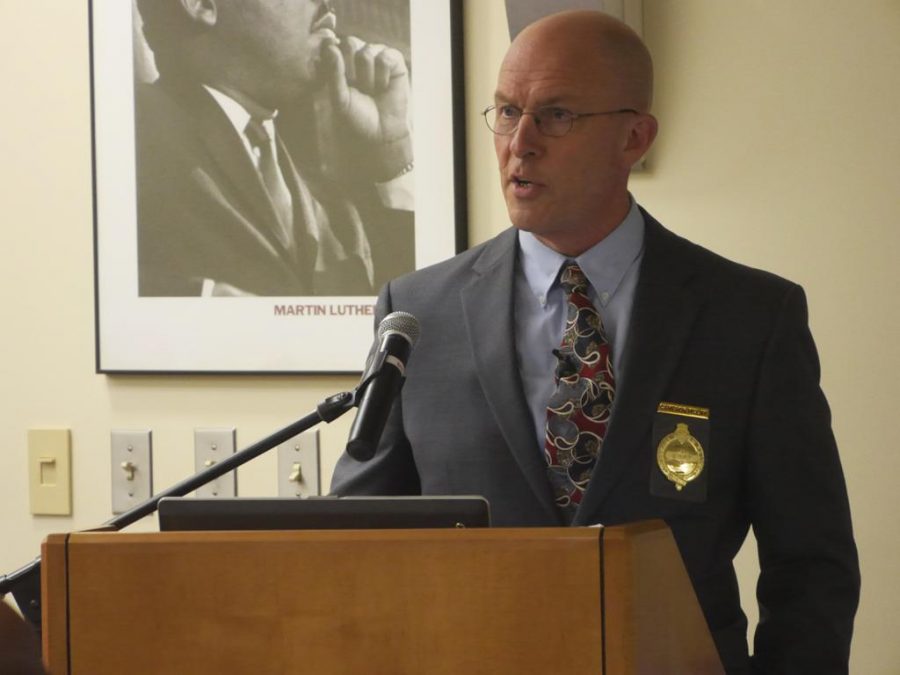After two years with the force, Chief of Pittsburgh Police Cameron McLay resigned from his post Friday.
McLay took the chief of police position in September 2014 after previously serving as a captain with the Madison, Wisconsin, police force and a consultant with the International Association of Chiefs of Police. McLay officially announced his resignation on Friday in a news conference alongside Pittsburgh Mayor Bill Peduto. His last day in office will be Nov. 8, which is also Election Day.
According to a press release from the mayor’s office, McLay is leaving his post “to pursue other professional opportunities.” He did not say whether he has another job lined up.
After Nov. 8, Assistant Chief Scott Schubert will serve as Acting Chief, and Peduto will select a permanent chief in the next 90 days, according to the release.
Schubert has served with the Pittsburgh Police Bureau since 1993 and held every position leading up to his swear-in as assistant chief in December 2014. He currently serves as the assistant chief of the operations division, which includes six zones, such as the Collision Investigation Unit and the Street Response Unit.
Serving alongside Schubert currently are Assistant Chief of Investigations Maurita Bryant and Assistant Chief of Administration Thomas Stangrecki.
Both Schubert and Stangrecki began serving as assistant chiefs during McLay’s time with the bureau.
During his tenure, McLay instituted training for officers and community members on implicit bias and procedural justice and released an analysis of the bureau’s use of force during the past five years. McLay also instituted a policy allowing the public to see real-time crime information and fostered relationships between the Bureau and community members.
“When I entered office, I knew what the police bureau needed was a reformer,” Peduto said in a press release. “With the indictment and conviction of the former chief, with community-police relations at risk and morale among the rank-and-file at an all-time low, it required someone from the outside to get us to the point where we are today. Cam McLay was exactly the person we needed.”
According to the release, complaints against the police are down more than 40 percent, and lawsuits are down more than 50 percent since McLay’s hiring in 2013.
“At this point, I earnestly believe that I have accomplished all that I am able to do. Accordingly, I have decided to step aside to pursue other options,” McLay said in the release.
The average time for a police chief to serve is three years, according to Peduto. McLay –– who was the first chief selected from outside the Pittsburgh bureau in 157 years –– served for two.
In September, a poll of the Pittsburgh police officers found that more than half of the officers on the force had no confidence in McLay’s leadership.
Since he became Pittsburgh chief of police, McLay and officers have had repeated disagreements over his methods of reducing police brutality and improving community relations.
At the end of 2014, McLay took a photo with a sign reading “I resolve to challenge racism at work #EndWhiteSilence,” which upset some union members who saw the photo as an implication that the bureau was currently racist.
In April 2016, police officers said the department forced them to work shifts for the Pittsburgh marathon, which they said was illegal as the shifts were supposed to be voluntary. McLay apologized to the officers, saying “far too many [police officers] were required to work this event with inadequate notice.”
Several officers refused to work a Beyonce concert in May, which was also voluntary.
Recently, the Fraternal Order of Police accused McLay of breaking municipal code when he spoke at the Democratic National Convention in July, as officers are not supposed to show preference for any political candidate or party.
“The city is in debt to Cam for his contributions to the community, taking all the shots and criticisms that come with making changes and putting the Pittsburgh Bureau of Police on a successful pathway,” Peduto said in the release. “We will continue on that pathway for years to come.”


